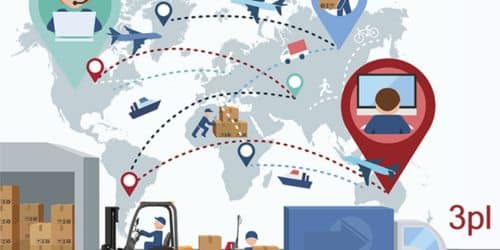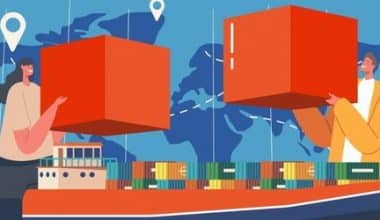If you own an ecommerce firm, order fulfillment is an essential aspect of your daily operations. When your company grows, you may discover that delivering customer orders in-house is no longer an option.
This is where third-party logistics 3PL comes in! This guide will teach you all you need to know about 3PLs so you can decide if they’re perfect for you.
What is Third-Party Logistics?
Third-party logistics, or 3PL, is synonymous with a fulfillment warehouse or fulfillment center. Companies that offer 3PL services offer many of the same services as order fulfillment companies. These services include:
- Warehousing
- Inventory control
- Shipping and Receiving
- FTL and LTL freight transport
- Selecting and packaging
- Kitting and customization
- Reverse logistics (returns)
An eCommerce fulfillment company is a third-party logistics company. To outsource your logistics operations, it offers all the services you require.
Many 3PL services companies specialize in various fulfillment and warehousing kinds. Some people are prepared for cold gratification. These warehouses can store and ship chilled or frozen food supplies. Several 3PL companies are prepared to store and ship dangerous products.
Functions of 3PL Providers
#1. Shipping and Receiving
Shipping and receiving 3PL providers are concerned with managing the shipment process from beginning to end. These companies frequently use technology, typically a transportation management system (TMS) or integrated freight management services. These technologies were created to improve efficiency and automate time-consuming operations such as freight payment and accounting. Some 3PL providers also provide carrier relationship management, freight data management, and matrix reports for real-time visibility and greater transparency throughout the shipping process.
#2. Transportation
Transportation 3PL providers are in charge of transporting goods or services between locations. A common example is when a 3PL provider manages an inventory shipment between a company and a buyer. Several transportation 3PL providers frequently rely on other transportation companies to execute the obligations for their partners.
#3. Warehousing
Warehousing 3PL providers are one of the most frequent forms of third-party logistics providers. A warehouse 3PL is a company that specializes in the storage and distribution of goods and/or services and is incorporated into the company’s warehousing and transportation procedures. Numerous warehouse 3PL providers provide adaptable solutions for storage, distribution, and product transportation.
#4. Distribution
Outbound order fulfillment, picking and packaging, custom labeling, and manufacturing are just a few of the many distribution and wholesale services offered by 3PL companies. The efficient distribution of big product volumes can be difficult for a small company to manage; by outsourcing distribution to a third-party logistics provider, its personnel can focus on other core competence business duties.
What is 3PL?
Third-Party Logistics, or 3PL, is what it sounds like. Order fulfillment and Third Party Logistics are frequently used interchangeably. A third-party warehouse offers a comprehensive variety of eCommerce fulfillment services. Warehousing, order processing, and shipping and receiving are all examples of this. Many 3PL warehouses offer additional services. Customer service returns processing, and personalization is a few examples.
The 3PL business model is the most frequent type of outsourced logistics company. There are other sorts, such as 4PL and 5PL, but by far the majority of companies, large and small, are interested in 3PL.
3PL vs. 4PL
A fourth-party logistics (4PL) company offers many of the same services as a third-party logistics (3PL), but there are several key differences.
For starters, a 4PL’s role is substantially broader than that of a 3PL. According to the Council of Supply Chain Management Professionals (CSCMP), a 4PL is “typically a separate business established as a joint venture or long-term contract between a principal client and one or more partners.”
In a word, a 4PL is in charge of the planning, administration, and design of a supply chain from beginning to end, as opposed to typical delivery, distribution, and transportation functions.
Benefits of Third-Party Logistics
As previously said, there are numerous reasons why companies seek out the logistical services of a 3PL. Outsourcing to a third-party logistics provider can save time and money while also delivering a better and more affordable experience for clients. Here are some of the most typical reasons why firms opt to collaborate with a 3PL.
#1. Scalability
A 3PL provider can scale space, manpower, and transportation based on services. Manufacturers, suppliers, and other producers can expand more successfully and uniquely in new markets with significantly less effort. A 3PL is intended to optimize logistics activities, which you may have less expertise in, and clear the way for increased business growth.
#2. Savings in both time and money
A firm realizes that success depends on a particular level of efficiency, and here is where a 3PL may make a significant difference. Rather than allocating money and resources toward building and maintaining a warehouse, deciding how to transport goods and/or services, optimizing services, and staying up to date with new technologies through an in-house management model, a 3PL eliminates those costs and frees up your key employees to focus on manufacturing, strategic planning, and operational processes that better enable business growth.
#3. Expansion
The use of 3PL services makes it easier than ever for firms to expand into new markets and areas, particularly emerging countries. Working with a 3PL allows a company to utilize new supply chains, improve customer service, and enter previously untapped areas. Distribution centers and warehouses from third-party logistics service providers, who frequently incorporate the necessary security and compliance procedures into their service offerings and have obtained the necessary accreditation to offer global services, make such expansion more accessible than ever.
Disadvantages of Third-Party Logistics
While there are many benefits for companies to use a 3PL, there is another side to the coin.
Notwithstanding the potential benefits, hiring third-party logistics companies has its own set of hazards.
#1. Control Failure
When a business chooses a 3PL provider, it gives up some control over the delivery. When a company agrees to partner with a third-party logistics provider, they are entrusting the 3PL to satisfy the agreed-upon SLAs, which involves a significant leap of faith for functions that have a direct impact on customer satisfaction. If one party is utilizing inferior B2B integration software, the smooth sharing of crucial EDI and non-EDI information may be jeopardized. If your B2B integration software is unable to consistently receive and ingest an EDI load tender, it might hurt trade partner relationships. Furthermore, sharing certain private information with a third party (source, order information, etc.) may make companies feel vulnerable in the event of a data breach.
#2. Cost
While a 3PL might save a company time and money, external circumstances (tariffs, over-regulation, weather, etc.) can cause expenses to rise. A 3PL company may appear to be financially advantageous at first glance, but you are at the mercy of an external trading partner and its business strategy.
Once-standard transaction fees can eventually increase as your company uses more services, and they may be more expensive than an in-house logistics operation. Furthermore, it is frequently difficult to develop a cost-effective collaboration between a shipper and a 3PL, and you will have little influence over this.
#3. Business Knowledge
If you work in a highly regulated industry or have very specialized demands (cold storage, temperature-controlled delivery, etc.), a standard 3PL may not be right for you. Furthermore, 3PLs frequently have hundreds or even thousands of customers and may not provide you with the attention you require. How easy is it to get in touch with them for help? How quickly will they respond to your requests? It is vital to select a 3PL that thoroughly knows your company, its goals, and how effective logistics and distribution can support those goals.
Who Should Think About Outsourcing Their Fulfillment Logistics to a 3PL?
Almost any ecommerce store, regardless of ecommerce platform, sector, or product category, can benefit from outsourcing fulfillment. Here are three indicators that you’re ready to outsource fulfillment to a third-party logistics provider:
#1. You ship more than 100 orders every month.
There is no magic number, but if your order volume has skyrocketed and you can’t keep up, it’s time to outsource to shippers. It’s the stage where you’re asking friends and family members to assist you to load boxes or staying up until the wee hours of the night just to meet demand.
This is a problem since you’re swamped by low-cost tasks that don’t create income, and it’s preventing you from growing. And as you expand, you will devote more time to fulfillment and less time to running your firm.
Every hour you spend reacting to new orders — packing stuff, printing labels, traveling to the post office, standing in line, and so on — is an hour you’re missing out on the opportunity to recruit more consumers, develop new products, and start marketing campaigns.
#2. You’re running out of room to keep inventory.
As your order volume increases, you’ll require more inventory on hand at all times. If you’re fulfilling orders from home, it can be difficult to find storage space. A 3PL warehouse can spare you from a garage or living room full of stuff – as well as fights with significant others or roommates.
Outsourcing inventory warehousing and order fulfillment to a third-party logistics provider (third-party logistics provider) will help you keep organized and manage inventory more efficiently. You can also expand your product line without being constrained by inventory storage space.
#3. You wish to provide free 2-day shipping.
Amazon has made free 2-day shipping the industry standard. But, if you self-fulfill orders, giving free 2-day delivery might eat into your margins significantly – especially if you provide accelerated 2-day air rather than ground shipment.
Partnering with a 3PL can make giving free 2-day shipping more viable and inexpensive for shops of all sizes.
How To Choose the Best Third-Party Logistics Company
Working with a 3PL company may seem like a no-brainer at this point – it may help your organization save time and money, freeing up resources to focus on product development, marketing, and business growth.
But, when it comes to selecting a 3PL company to manage order fulfillment for your online store, the alternatives can seem limitless.
It’s critical to choose a fulfillment company you can rely on to handle your inventory, give a great customer experience, maintain high customer happiness, and ultimately assist you in growing your business.
These are three critical questions to ask a potential third-party fulfillment provider to ensure you choose a partner who is a good fit for your organization.
#1. Do your requirements go beyond the basics?
When outsourcing order fulfillment, consider looking for a solution that goes beyond the standard pick, pack, and ship paradigm. This means that the 3PL coordinates with all components of the retail supply chain, rather than just one isolated part of the fulfillment process.
This modern approach to fulfillment can help your company make more educated decisions about supply and demand, as well as provide a better overall experience for your customers.
#2. How does their technology function?
Finding technology that works not just for you, but with you, is one of the most crucial aspects of selecting a fulfillment solution. There are two key technological components to consider:
- How the 3PL’s technology will connect to your online business (s)
- How 3PL software can help you exploit data
These two components comprise what we refer to as a tech-enabled 3PL. A technology-enabled 3PL is a company that has created efficient, integrated shipping and fulfillment solutions for ecommerce enterprises.
In addition to typical fulfillment services like as warehousing, picking, packaging, and shipping, the 3PL’s technology assists with everything from automation, order, and inventory management, to order tracking and ecommerce returns.
#3. Where Can I Find Their 3PL Fulfillment Centers?
When we talk about a 3PL’s location, we’re not only talking about where its headquarters or offices are. You should also know how many fulfillment facilities the 3PL owns and operates, as well as where each one is located.
This data will help you assess whether you can provide your consumers with the quickest delivery and most cheap 3PL shipping choices. As previously stated, the quantity and location of 3PL warehouses can help determine your shipping strategy, including distributed inventory and two-day shipping.
Companies That Provide Third-Party Logistics
Now that you know what to look for in a 3PL shipping solution, remember to select one that matches your needs. Extra work and clumsy software do not help you get orders out faster.
Here are some of the best ecommerce shipping companies and third-party logistics providers:
- ShipBob
- FedEx Distribution Network
- Logistics Rakuten
- RedStag
- UPS Supply Chain Solutions
- Shopify Shipping
- Shipwire
Why is Third-party Logistics Important?
Handling product packaging and delivery on your own may be complicated and expensive. With Amazon’s ever-increasing influence on the retail market, ecommerce stores that want to compete must provide rapid and economical shipping. 3PLs specialize in supply chain management, assisting these companies in streamlining the shipping process for greater cost-effectiveness and logistical efficiency.
What Is the Distinction Between a Third-Party Logistics Provider and a Freight Forwarder?
A freight forwarder works with several carriers, such as air, train, and highway, to transport products from one location to another. Freight forwarders manage the relationships and critical activities in the shipping process, such as negotiating freight adjustments and completing shipment documentation, but they do not move the freight. They serve as a go-between for companies wishing to send their goods and carriers. 3PLs manage the whole supply chain, from picking and packaging to warehouse storage and shipment.
When Should You Utilize a Third-Party Logistics Provider?
If your online site has witnessed tremendous development in the last year, it may be time to consider working with a 3PL company. When companies want to scale their business but do not want to develop and maintain their warehouse in-house, they frequently partner with a 3PL. Instead, they will seek the expertise of a 3PL company to handle all shipping logistics.
How Is the Performance of a 3PL Measured?
Once you’ve chosen a 3PL company to handle your shipping logistics, it’s critical to monitor performance by examining various KPIs. The percentage of returns due to shipment damage or error is one shipping KPI. This KPI guarantees that shipment quality and accuracy are maintained. On-time delivery is another critical shipping KPI to monitor. This KPI provides insight into whether or not there is a bottleneck in the present fulfillment process that needs to be resolved for maximum efficiency.
Conclusion
Outsourcing fulfillment is a terrific method to expand the capacity and reach of your eCommerce business. You won’t need to hire any additional staff, but you will be able to accomplish more. Only the services and warehouse space that you require are charged to you. And you hire professionals to handle your logistics. Your 3PL warehouse expertise can improve your fulfillment processes.
Fulfillment isn’t the most glamorous aspect of an eCommerce store, but it’s crucial to your success. Poor fulfillment can lose you money and customers. More favorable reviews and devoted consumers can result in excellent fulfillment. The growth curve of your company will be influenced by fulfillment services. In the long run, excellent third-party logistics can keep that trend line going up and up.
- WHAT IS 3PL: Services, Examples & Companies
- WHAT IS LOGISTICS? How Can Businesses Utilize It
- LOGISTICS MANAGEMENT SYSTEM (LMS): Benefits and Elements
- FULFILLMENT CENTER: Meaning And Its Benefit To Small Businesses
- 3PL LOGISTICS: Meaning, Examples & Companies






